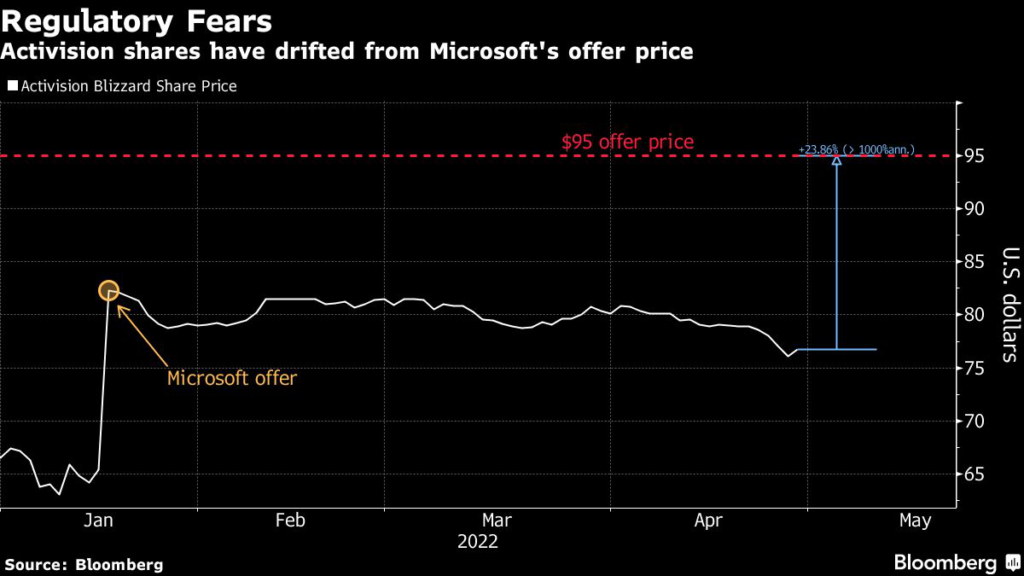(Bloomberg) — Activision Blizzard Inc. shareholders approved the company’s $69 billion sale to Microsoft Corp on Thursday, but Wall Street is betting that Biden antitrust enforcers could unravel one of the largest mergers in U.S. history.
Microsoft’s $95 offer is a 24% premium over Activision’s current share price, indicating investors see risk the buyout won’t close as planned. This risk premium is more than double that of Twitter Inc. following Elon Musk’s offer, and higher than most of the announced — but still pending — deals tracked by Bloomberg.
Tough-talk from President Joe Biden’s antitrust enforcers is fueling investor fears that the deal could be blocked or subject to delays even if it prevails, said Matt Perault of New Street Research. Plus, the deal will also need approval by other governments including the European Union and China.
The merger, which has until June 2023 to close, would make Microsoft the world’s No. 3 gaming company, and would give it ownership over two of the most recognizable gaming brands on the planet in Call of Duty and World of Warcraft. Microsoft would also gain control of Candy Crush developer King, which made $2.58 billion in revenue last year.
More than 98% of Activision shares voted in favor of the acquisition, the company said. The complete results of the meeting will be reported in a form 8-K to be filed with the U.S. Securities and Exchange Commission by early next week. The shares ticked slightly higher and closed at $76.70 in New York.
SOC Investment Group, an activist shareholder group with a small stake, earlier this month encouraged shareholders to vote down the deal. That group and other investors have spoken out against a potential golden parachute for embattled Activision Chief Executive Officer Bobby Kotick.
The deal will be reviewed by the Federal Trade Commission, which is led by Lina Khan, who has long advocated for a more forceful approach to reviewing deals, particularly by the biggest technology companies. Under her leadership, the agency has blocked Nvidia Corp.’s acquisition of Arm Ltd. as well as Lockheed Martin Corp.’s deal for Aerojet Rocketdyne Holdings Inc. She also resurrected the FTC’s monopoly case against Meta Platforms Inc., which seeks to split off WhatsApp and Instagram.
Fears of a legal challenge are well-founded, based on Khan’s statements opposing growth via acquisitions by big tech platforms, said Jennifer Rie, an antitrust analyst with Bloomberg Intelligence. Plus, it’s likely the FTC will have a Democratic majority by the time a decision has to be made, alleviating a stalemate that may have caused inaction on the Amazon-MGM merger, Rie said.
Not everyone is worried. Wedbush Securities analyst Michael Pachter places the odds of an FTC lawsuit at 10%, and chances of winning a case at 0% due to the difficulty in defining the concentrated market that this merger would cause. Microsoft wouldn’t have a massive share in the market for console games or videogames at-large, and current antitrust law overlooks so-called freemium business models common in gaming, Pachter said.
He attributes market fear to lack of familiarity with the video-game industry and the FTC’s tough-talk on mergers. The agency “can’t win this one — so if they can’t win, they’re not going to sue. And Microsoft’s going to call their bluff.” Biden’s new antitrust chiefs have said they’re willing to take risks on big cases.
Read more on Microsoft’s stellar reputation in Washington
Even if an FTC challenge doesn’t ultimately prevail, a protracted legal fight could prompt the companies to abandon the deal, analysts said. Despite being the nation’s second-largest company, Microsoft has escaped much of the scrutiny lobbed at its peers. Its experience with regulators and proactive communications about the deal could make a difference in winning approval, said Betty Chan, a merger-arbitrage specialist at Elevation LLC.
“We are optimistic on the outcome at this point, but are still doing work to get more comfort on this.” Chan said.
(Updates shares. A previous version of this story was corrected to remove an erroneous amount of Kotick’s golden parachute.)
More stories like this are available on bloomberg.com
©2022 Bloomberg L.P.











